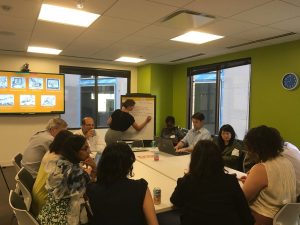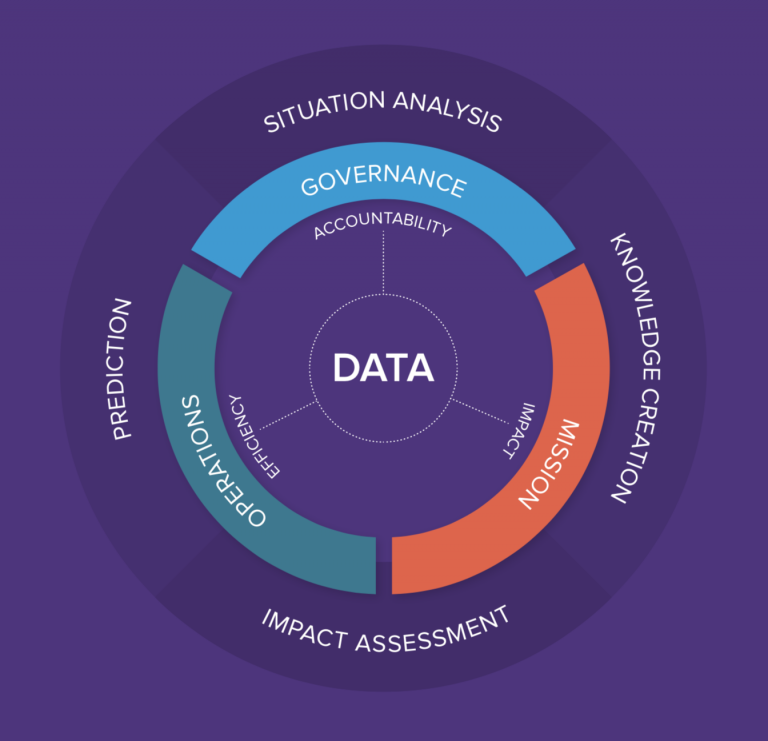Highlights:
- Machine ready? AI implications for non-profits and funders
- A petabyte to fight digital disinformation
- Fighting the cult of illiberal democracy
- Investigative journalism without any fear
- Cocreation to take down “stomach infrastructure”
In case you missed it…
Machine ready? AI implications for non-profits and funders
How is artificial intelligence changing non-profit work? Nicole Wallace takes stock, talking to experts on the opportunities and risks, including to fairness, as flagged by Martin Tisné of Omidyar Network (and TAI). In a complementary take, LSE researchers flag the dangers for CSOs of data-driven discrimination. What of paying people for their data? The Economist lays a further challenge to the plethora of future of work groups – thinking about “data as labour,” but what should apply for non-profits seeking people’s data?
Clearly funders need to be thinking about the implications of such issues for grantees – both to make progress on substantive issues (for example, the disruptive potential of bringing transparency to real estate markets), and for modes of operating (such as use of bots to free staff time). More controversial are big data implications for evaluation as flagged in an ongoing debate among evaluation protagonists.
Taking a step back, Stefaan Verhulst points to the potential of data-driven philanthropy building on experiences of local foundations. David Bonbright of Keystone Accountability goes further, suggesting philanthropy sector’s information infrastructure is wholly inadequate – he says it’s high time to focus on organizations instead of information.

A petabyte to fight digital disinformation
One emerging donor trend is investing in addressing data privacy concerns. Craigslist founder Craig Newmark joins those ranks as he puts a big chunk of his fortune into efforts to strengthen journalism and fight disinformation. Funder investments are already yielding results with the launch of the multi-donor supported Facebook independent research commission, Social Science One. As co-founder Gary King notes, “Social Science One has established an ethical structure for marshalling privacy preserving industry data for the greater social good while ensuring full academic publishing freedom.” Facebook is handing over a petabyte of data to King and his colleagues. See TAI Spotlight below for a member perspective on the implications for defining digital disinformation, understanding the problem and disaggregating responses. How much of their interactions are Facebook users ready to share in order to help future generations navigate the political terrain?
What is a petabyte? 1,024 terabytes, or a million gigabytes – in other words a LOT of digital information.
Insert Video: Does Facebook know you better than you do?
Fighting the cult of illiberal democracy
More broadly, can truth survive in today’s political context? The Washington Post reviews a series of publications that seeks to tell us. Some of these likely already on the reading lists of many attending the fifth OGP summit in Tbilisi this week. The Summit offers as good a moment as any to reflect on how far we have come in constructing convincing initiatives between governments and civil society in evolving open governance. Mukelani Dimba offers reassurance that open governments are the future while Joe Powell talks to open government as a response to the cult of illiberal democracy.
Chances are that the Bosnia and Herzegovina delegation in Tbilisi may be lauding their new open data portal for essential macroeconomic data, while the International Budget Partnership may be talking to the lessons of working with governments to form equitable and inclusive budgets for the society. Joe Powell will also hope to see signs of members making good anticorruption pledges and can applaud the African Union trying to move from slogans to actions around Africa’s first Anti-Corruption Day.
On a tangible note, new rules to related to money laundering in the European Union passed last Monday but the bloc now faces demands for additional improvements after suspected wrongdoing at banks in Baltic states and Malta reveals new regime weaknesses.
Investigative journalism without any fear
Investigative journalists had considered Iceland a haven, but now worry they are facing a swift crackdown. Surely no connection to the fact that Icelandic president Bjarni Benediktsson’s name emerged in the Panama Papers for financial offences? Partly in response Ingibjörg Dögg Kjartansdóttir, co-editor-in-chief of Stundin, is “creating a platform for investigative journalism without any fear.” Stundin gets funded through crowdfunding, subscriptions and public support, and its editors are required to publish all their private interests.
With the credibility that yields, they may want to turn their investigative noses towards tiny Nevis, which is apparently doubling down on selling secrecy to the super rich. Should we care? The Canadian Treasury would argue yes, having found that Canadians have been using offshore holdings to evade up to $3 billion in tax a year. Kalinka Iaquinto reminds us of the potential of transnational journalism networks not least in the Investiga Lava Jato.
Cocreation to take down “stomach infrastructure”
User centered design is the new gospel for thinking about data releases, but still rarely the practice – Development Gateway testing in Malawi gives an insight into the reality. Their team might compare notes with activists in Nigeria taking an ideation approach to tackling “stomach infrastructure” i.e. how to crack grassroots politics in a non-transactional way.
What is “stomach infrastructure”? – a popular term used to describe a politically motivated bribe, usually sharing of foodstuff, among the grassroots ahead of an upcoming election to vote in specific directions.
Finally, at TAI we like to encourage breaking down of silos among funders and practitioners. So good to see the value in bringing an accountability lens (and open contracting expertise in particular) to the community of climate change funders as suggested by a new investigation of Green Climate Fund procurement.
TAI spotlight
ON, Feedback Labs, and Global Giving launched the new report laying out under what conditions is information empowering. TAI and Felipe Estefan of ON were excited to be part of the OpenGov Hub conversation.

Kelly Born of Hewlett offers a thoughtful funder take on the potential of the new Facebook data being made available to researchers (see above).
Open Society Foundations launch a new guide for community-based practitioners on documenting citizenship and other forms of legal identity.
Last week was one for big picture conversations:
- Q&A with Rufus Pollock on making the Open Revolution a reality

- From Radical Democracy to Technical Policy: Analyzing the Spread of Participatory Budgeting around the World – hosted with the World Bank building on Hewlett and Omidyar Network sponsored research.
- Too Much of a Good Thing? Finding the Right Level of Donor and CSO Transparency – hosted with Funders Initiative on Civil Society, Human Rights Funders Network and the Ariadne Network
Want to see what you missed? Stay tuned for videos to come.
Finally, we are sad to say goodbye to Ava Danlog, our Communications Fellow, who is returning to do exciting work in the Philippines and beyond – but not before she offered a quick ‘comms 101’ training to Dante the Dog. Thanks for all the amazing work – Ava, not least on this Weekly.

News of our incoming Atlas Corps Fellow next week!
Calls: Proposals, papers, speakers and course invites
- Open Government Partnership now accepting applications: Advancing OGP’s Thematic Priorities window of the OGP Multi-Donor Trust Fund. Please visit the Trust Fund website for more details.
- Consultancy: Open Contracting Benefits for Government and the Private Sector
On the calendar
- The Empathic Facilitator: Leading a Transformative Group Process– July 28-29 (New York, NY)
- Civic Tech: India 2018– August- November (Bangalore, Delhi and/or Mumbai, India)
- 4th Annual African Tax Research Network Congress – September 10-12 (Morocco)
- 3rd Open Data Research Symposium – September 25 (Buenos Aires, Argentina)
- The Future is Open: 5th International Open Data Conference – September 27-28 (Buenos Aires, Argentina)
- European Evaluation Society – Evaluation for More Resilient Societies– October 1-5 (Thessaloniki, Greece)
- Feedback Summit 2018 – October 4-5 (Washington, DC, USA)
- 18th International Anti-Corruption Conference – October 22-24 (Copenhagen, Denmark)
- UN World Data Forum – October 22-24 (Dubai, UAE)
- BigSurv18 – Spain, Oct 25-27 (Barcelona, Spain)
- Public Sector Economics 2018 Conference – Fiscal Openness: Transparency, Participation and Accountability in Fiscal Policies – October 26 (Zagreb, Croatia)
- Canadian Open Data Summit – November 7-9 (Ontario, Canada)
- Data4Good Conference – November 14 (Birmingham, UK)
- Collective Impact Forum Convening – May 14-16, 2019 (Chicago, USA)
- Global Conference on Transparency Research – June 26 – 27, 2019 (Rio de Janeiro, Brazil)
